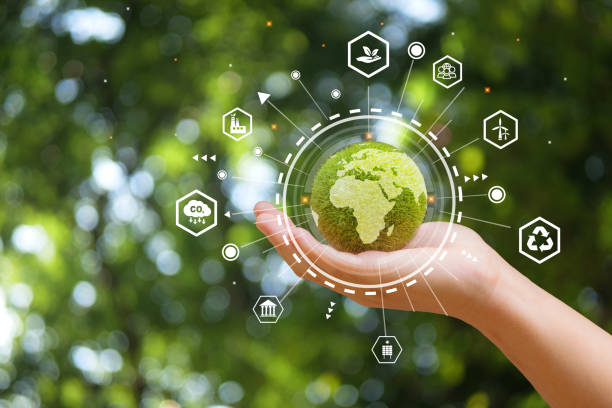The global debate over climate change, renewable energy, and sustainable development is complex, and it’s disheartening that in some parts of the world, particularly in certain African nations and other developing regions, climate denialism remains pervasive.
This resistance is often rooted in economic dependency on traditional industries like fossil fuels and unsustainable mining practices. In these countries, the move towards Net Zero goals, carbon capture technologies, and renewable energy may seem like a threat to established livelihoods.
However, the reluctance to embrace this shift puts these nations at risk of being left behind in an increasingly green, tech-driven global economy.
The Challenge: Climate Denialism and Sabotage
Many climate deniers view renewable energy as a passing trend, questioning its viability, or fearing it undermines their current economic base. In developing countries, especially those rich in fossil fuel resources, this denial can stem from a mix of short-term economic pressures, political interests, and lack of awareness about the long-term benefits of transitioning to greener alternatives. Unfortunately, this mindset often leads to attacks on those advocating for sustainability—labeling them as “traitors” or “saboteurs” of national interests.
Understanding the Roots of Resistance
- Economic Dependence on Fossil Fuels: For many countries, fossil fuels—oil, coal, natural gas—are the cornerstone of their economies. Fossil fuel exports generate critical revenue, and industries tied to fossil fuels provide employment and infrastructure. The shift to renewables might seem like an existential threat to these sectors. It’s natural to resist change when there’s a belief that the alternative might lead to job losses, weakened economies, or social instability.
- Political and Ideological Resistance: Some governments may also resist climate change initiatives because of ideological stances—either influenced by domestic political factors or external pressures from fossil fuel companies or other political entities. The idea of climate change may be dismissed as a “Western” agenda that doesn’t align with the needs or priorities of developing nations.
- Fear of Technological and Financial Disparities: There is a genuine concern that the green transition may be an expensive process, with developing nations fearing they cannot afford the technological advancements, infrastructure, and investments needed to switch from fossil fuels to renewable energy. These nations may feel that the green revolution is another form of neo-colonialism, imposing changes that benefit wealthy nations without considering the specific needs of the global south.
Why Climate Denialism Is Harmful to Everyone
While resistance to climate change mitigation policies may seem justified from a local or national perspective, it’s increasingly clear that climate change is a global issue. Failing to embrace sustainability and green technologies does more than delay progress; it exacerbates the problems of economic inequality and environmental degradation. Here are a few compelling arguments that can help shift perspectives:
- Economic Opportunities in Green Energy: The global green energy sector is growing rapidly. In 2023, the renewable energy sector was worth trillions of dollars, and investment in clean technologies is expected to continue expanding. Companies and countries that transition early to renewable energy stand to reap enormous economic benefits—creating jobs, fostering innovation, and securing their place in the future economy. By resisting this change, countries risk being left behind as they become more dependent on outdated fossil fuel industries.
- Job Creation in Renewables: Contrary to the narrative that renewable energy will cost jobs, the renewable sector is one of the largest job creators globally. For example, in sectors like solar energy, wind power, and electric vehicle production, the demand for skilled workers is growing rapidly. By adopting green technologies, countries can create millions of jobs, reduce poverty, and stimulate local economies. Even in Africa, which is particularly vulnerable to climate change, renewable energy projects can help drive economic diversification and enhance energy security.
- Climate Impact and Global Competitiveness: The failure to invest in sustainable technologies will ultimately leave countries vulnerable to the long-term impacts of climate change—extreme weather, droughts, flooding, and loss of biodiversity. Developing nations, which are often the most affected by these changes, have the most to gain from a transition to cleaner, more resilient infrastructure. Countries that fail to adapt to the demands of climate mitigation and green energy risk becoming economically less competitive in the global market.
- Energy Independence and Security: Fossil fuel dependence often ties countries to volatile global energy markets. By investing in renewable energy, nations can reduce their dependency on imports and ensure a more secure and sustainable energy future. Countries like India, China, and various African nations are already making great strides in solar and wind energy to ensure their energy independence and avoid the high costs associated with fossil fuel imports.
- International Pressure and Trade Dynamics: International markets are increasingly moving toward green standards. Policies like the EU Green Deal, and trade measures such as carbon tariffs, are likely to impose restrictions or penalties on countries that fail to meet emissions targets or adopt sustainable practices. Countries that delay the transition to a green economy could find themselves excluded from lucrative markets or penalized in trade agreements, making their resistance a growing economic disadvantage.
Making the Case for a Global Wake-Up Call
To address the stubborn resistance to climate action, a global wake-up call is necessary—one that unites stakeholders from all sectors: governments, corporations, and civil society. Here are some ways to push forward:
- Education and Awareness: A significant barrier to change is the lack of awareness. Educating communities and leaders about the real benefits of renewable energy and sustainable industries is crucial. This can be done through targeted programs, international collaborations, and bringing success stories from countries that have made the transition.
- Demonstrating Financial Viability: Clear, data-driven evidence that sustainability projects are profitable is key to shifting mindsets. By showing how countries and companies can benefit economically from green energy, such as through subsidies, grants, and investment opportunities, we can help dispel the notion that clean energy is a costly or impractical choice.
- International Support and Partnerships: Wealthier nations and multinational organizations must step up their efforts to support developing nations with funding, technology, and infrastructure to help them transition. The UN climate accords, Paris Agreement, and initiatives like the Green Climate Fund should be leveraged to provide both financial and technical assistance to help countries make the transition to clean energy without exacerbating their economic challenges.
- Leveraging Corporate Influence: Multinational corporations, which often have operations in developing countries, must take a more active role in promoting sustainability in the regions where they do business. These companies can provide expertise and act as bridges between developed and developing countries to adopt clean technologies.
- Highlighting the Cost of Inaction: By showing the tangible and long-term costs of inaction, such as the devastating effects of climate change, countries can be made to see that avoiding the green transition ultimately puts their future at risk. Demonstrating how sustainability can future-proof economies and mitigate the devastating effects of climate change may encourage more action.
Conclusion: A Collective Shift Toward a Green Future
In the face of climate denial and resistance, we must focus on creating collaborative partnerships, building awareness, and demonstrating the financial and strategic advantages of sustainable development. Transitioning to a low-carbon economy is not only an environmental imperative but also a powerful economic opportunity that can provide developing nations with a pathway to a greener, more resilient, and more prosperous future.
Ultimately, the goal is to change the narrative from climate denial to climate opportunity, demonstrating that embracing green technologies and sustainable development is the key to economic growth, job creation, and ensuring a stable climate for future generations. The time for change is now, and it’s crucial that we work together to inspire a global shift toward renewables and sustainability—for the benefit of all.



